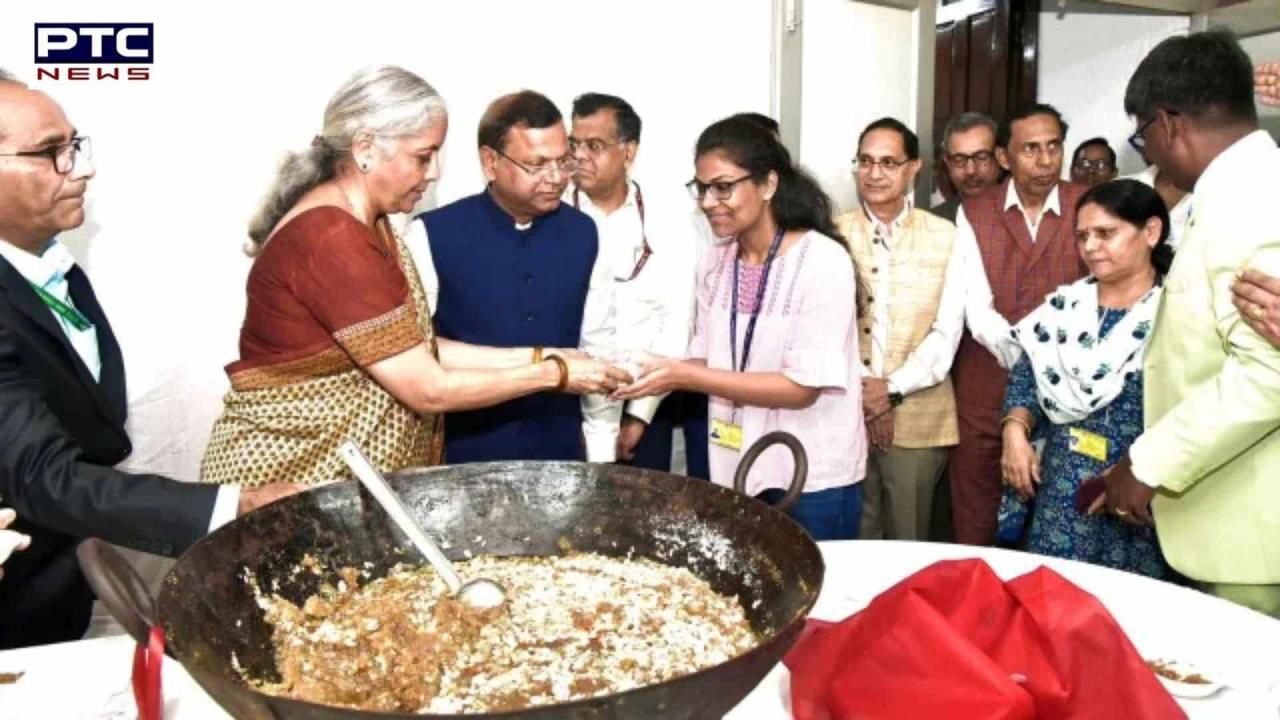Finance Minister participates in customary Halwa ceremony, signaling final stage of budget preparation
The ceremony involves preparing and serving the traditional dessert "halwa" to representatives and employees of the finance ministry who work on the budget preparation.

PTC News Desk: Participating in a customary "halwa" ceremony on Tuesday, Finance Minister Nirmala Sitharaman marked the end of the planning process for the Union Budget 2024–25, which will be presented in the Lok Sabha on July 23.
The ceremony involves preparing and serving the traditional dessert "halwa" to representatives and employees of the finance ministry who work on the budget preparation.
The finance minister and other senior officials are present, and it is held in the basement of North Block, the ministry's headquarters in the nation's capital.
The traditional Halwa ceremony, held in New Delhi with the participation of Union Minister for Finance and Corporate Affairs Smt. @nsitharaman, marked the beginning of the final stage of the budget preparation process for the Union Budget 2024–25.
In addition to wishing the involved authorities well, the finance minister examined the preparations and conducted a round of the Budget Press as part of the ceremony. The entire Union Budget 2024–25, like the previous three complete Union Budgets and one interim, will be distributed electronically.
For hassle-free budget access, the "Union Budget Mobile App" will have all of the Union Budget documents—such as the Finance Bill, Demand for Grants (DG), Annual Financial Statement, or Budget—available. These documents are required by the Constitution.
In addition to Sitharaman, other high-ranking officials in attendance were Financial Services Secretary Vivek Joshi, Economic Affairs Secretary Ajay Seth, and Minister of State for Finance Pankaj Chaudhary.
Also Read: 'Godman' constructs temple at 16,000 feet on Uttarakhand glacier; investigation launched
Halwa ceremony:
It serves as a sort of "send-off" for employees of the finance ministry and others who work on the yearly financial statement of the Union government. They go into what is known as a "lock-in" period, where they remain isolated from the outside world in North Block's basement in order to preserve the confidentiality of the final budget document.
They won't come out till the finance minister has finished speaking in the Lok Sabha about her budget. It is regarded as a thank-you gift for everyone who contributed to the budget. A printing press that was customarily used to print budget documents for 40 years, from 1980 to 2020, is located in the basement of north block.
After that, the budget turned digital, with the exception of a few documents that were printed and a large-scale distribution that took place online or through a mobile app. By going digital, the lock-in period was shortened from its former duration of up to two weeks to just five days.
Also Read: CBI arrests suspect for stealing NEET-UG paper from NTA trunk, reports says
Printing Press:
Using a specialised government press, North Block prints all documents relevant to the budget. The documents were first printed at Rashtrapati Bhavan, but after they were leaked in 1950, they were moved to a press on Minto Road in the nation's capital, and then in 1980 to North Block.
The printing crew had to spend up to two weeks in quarantine within the printing press located in the North Block basement due to the intricate nature of the task of producing several hundred copies of the extensive budget documents.
Tradition:
The 'halwa' ceremony has persisted as a tradition, despite the Narendra Modi government doing away with several traditional aspects of the Budget since taking office in 2014, including combining the Rail Budget with the main Budget, moving the presentation date to February 1 instead of the last day of that month, and switching to a digital format.
Also Read: BRS leader K Kavitha, held in Tihar Jail, rushed to Delhi's DDU hospital
